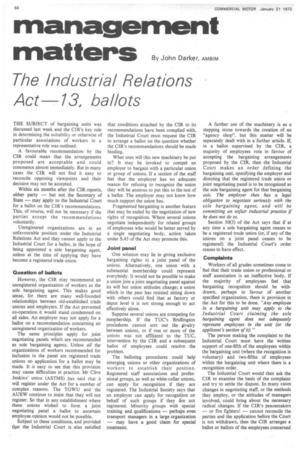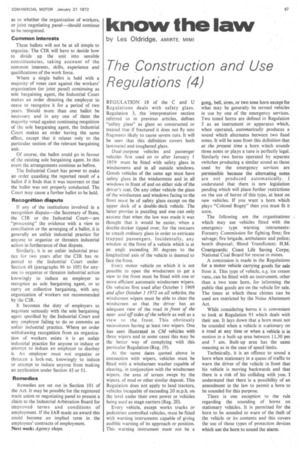management
Page 58

Page 59

If you've noticed an error in this article please click here to report it so we can fix it.
matters By John Darker, AMBIM
The Industrial Relations Act 13, ballots
THE SUBJECT of bargaining units was discussed last week and the CIR's key role in determining the suitability or otherwise of particular associations of workers in a representative role was outlined.
A favourable recommendation by the CIR could mean that the arrangements proposed are acceptable and could commence almost immediately. But in many cases the CIR will not find it easy to reconcile opposing viewpoints and their decision may not be accepted.
Within six months after the CIR reports, either party — but not the Secretary of State — may apply to the Industrial Court for a ballot on the CIR's recommendations. This, of course, will not be necessary if the parties accept the recommendations voluntarily.
Unregistered organizations are in an unfavourable position under the Industrial Relations Act and they cannot apply to the Industrial Court for a ballot, in the hope of being appointed a sole bargaining agent, unless at the time of applying they have become a registered trade union.
Question of ballots However, the CIR may recommend an unregistered organization of workers as the sole bargaining agent. This makes good sense, for there are many well-founded relationships between old-established trade unions and employers. If the Act prevented co-operation it would stand condemned on all sides. An employer may not apply for a ballot on a recommendation concerning an unregistered organization of workers.
The same principles apply for joint negotiating panels which are recommended as sole bargaining agents. Unless all the organizations of workers recommended for inclusion in the panel are registered trade unions no application for a ballot may be made. It is easy to see that this provision may cause difficulties in practice. Mr Clive Jenkins' union (ASTMS) has said that it will register under the Act for a number of complex reasons. The TGWU and the AUEW continue to insist that they will not register. So that in any establishment where these unions wished to form a joint negotiating panel a ballot to ascertain employee opinion would not be possible.
Subject to these conditions, and provided tat the Industrial Court is also satisfied that conditions attached by the CIR to its recommendations have been complied with, the Industrial Court must request the CIR to arrange a ballot on the question whether the CIR's recommendations should be made binding.
What uses will this new machinery be put to? It may be invoked to compel an employer to bargain with a particular union or group of unions. If a section of the staff feel that the employer has no adequate reason for refusing to recognize the union they will be anxious to put this to the test of a ballot. The employer may not know how much support the union has.
Fragmented bargaining is another feature that may be ended by the negotiation of new rights of recognition. Where several unions negotiate independently for related groups of employees who would be better served by a single negotiating body, action taken under S.45 of the Act may promote this.
Joint panel One solution may lie in giving exclusive bargaining rights to a joint panel of the unions. Alternatively, one union with a substantial membership could represent everybody. It would not be possible to make a union join a joint negotiating panel against its will but union attitudes change; a union which in the past has resisted sitting down with others could find that at factory or depot level it is not strong enough to act effectively alone.
Suppose several unions are competing for membership. If the TUC's Bridlington procedures cannot sort out the iivalry between unions, or if one or more of the unions was not affiliated to the TUC, intervention by the CIR and a subsequent ballot of employees could resolve the problem.
The balloting procedures could help emerging unions or other organizations of workers to establish their position. Registered staff associations and professional groups, as well as white-collar unions, can apply for recognition if they are registered. The Industrial Society says that an employer can apply for recognition on behalf of such groups if they gre not registered. Minority groups with special training and qualifications — perhaps even transport managers in a large organization — may have a good claim for special treatment.
A further use of the machinery is as a stepping stone towards the creation of an "agency shop", but this matter will be separately dealt with in a further article. If, in a ballot supervised by the CIR, a majority of employees vote in favour of accepting the bargaining arrangements proposed by the CIR, then the Industrial Court makes an order defining the bargaining unit, specifying the employer and directing that the registered trade union or joint negotiating panel is to be recognized as the sole bargaining agent for that bargaining unit. The employer then has a legal obligation to negotiate seriously with the sole bargaining agent, and will be committing an unfair industrial practice if he does not do so.
Section 50(3) of the Act says that if at any time a sole bargaining agent ceases to be a registered trade union (or, if any of the unions on a joint panel ceases to be registered) the Industrial Court's order ceases to have effect.
Complaints
Workers of all grades sometimes come to feel that their trade union or professional or staff association is an ineffective body. If the majority of employees feel that bargaining recognition should be withdrawn, perhaps in favour of another specified organization, there is provision in the Act for this to be done. "Any employee in a bargaining unit may apply to the Industrial Court claiming the sole bargaining agent does not adequately represent employees in the unit (or the applicant's section of it)."
The person making the complaint to the Industrial Court must have the written support of one-fifth of the employees within the bargaining unit (where the recognition is voluntary) and two-fifths of employees within the bargaining unit where there is a recognition order.
The Industrial Court would then ask the CIR to examine the basis of the complaint and try to settle the dispute. In many cases changes in negotiating staff, or the methods they employ, or the attitudes of managers involved, could bring about the necessary radical changes. If the CIR's peacemakers — or fire fighters! — cannot reconcile the parties and the application before the Court is not withdrawn, then the CIR arranges a ballot or ballots of the employees concerned as to whether the organization of workers, or joint negotiating panel—should continue to be recognized.
Common interests These ballots will not be at all simple to organize. The CIR will have to decide how to divide up the unit into sensible constituencies, taking account of the common interests, skills, experience and qualifications of the work force.
Where a single ballot is held with a majority of votes cast against the workers' organization (or joint panel) continuing as sole bargaining agent, the Industrial Court makes an order directing the employer to cease to recognize it for a period of two years. Should more than one ballot be necessary and in any one of them the majority voted against continuing reognition of the sole bargaining agent, the Industrial Court makes an order having the same effect, except that it relates only to the particular section of the relevant bargaining unit.
Of course, the ballot could go in favour of the existing sole bargaining agent. In this event the arrangements continue as before.
The Industrial Court has power to make an order quashing the reported result of a ballot if it finds that it was incorrect or that the ballot was not properly conducted. The Court may cause a further ballot to be held.
Recognition dispute If any of the institutions involved in a recognition dispute—the Secretary of State, the CIR or the Industrial Court—are "processing" the evidence with a view to conciliation or the arranging of a ballot, it is generally an unfair industrial practice for anyone to organize or threaten industrial action in furtherance of that dispute.
Similarly, it is an unfair industrial practice for two years after the CIR has reported to the Industrial Court underSection 48 (paragraphs 96 to 105) for anyone to organize or threaten industrial action knowingly to induce an employer to recognize as sole bargaining agent, or to carry on collective bargaining, with any organization of workers not recommended by the CIR.
It becomes the duty of employers to negotiate seriously with the sole bargaining agent specified by the Industrial Court and any employer failing to do so commits an unfair industrial practice. Where an order withdrawing recognition from an organization of workers exists it is an unfair industrial practice for anyone to induce or attempt to induce an employer to disobey it. An employer must not organize or threaten a lock-out, knowingly to induce or attempt to induce anyone• from making an application under Section 45 or 51.
Remedies Remedies are set out in Section 101 of the Act. It may he possible for the registered trade union or negotiating panel to present a claim to the Industrial Arbitration Board for improved terms and conditions of employment. If the IAB made an award this could become an implied term in the employees' contracts of employment.
Next week: Agency shops.










































































































